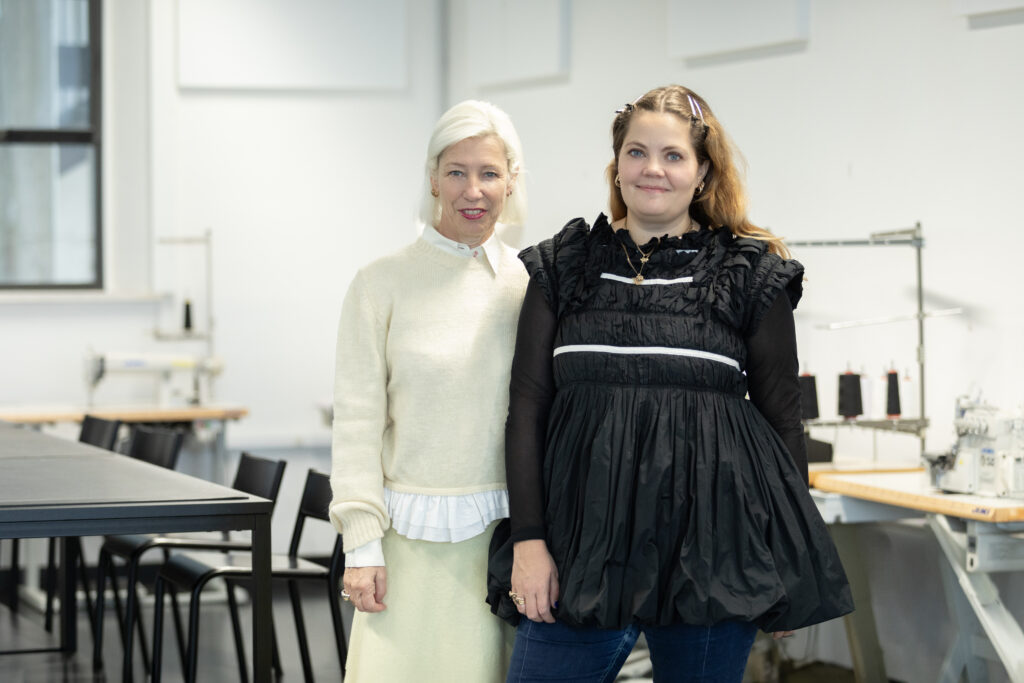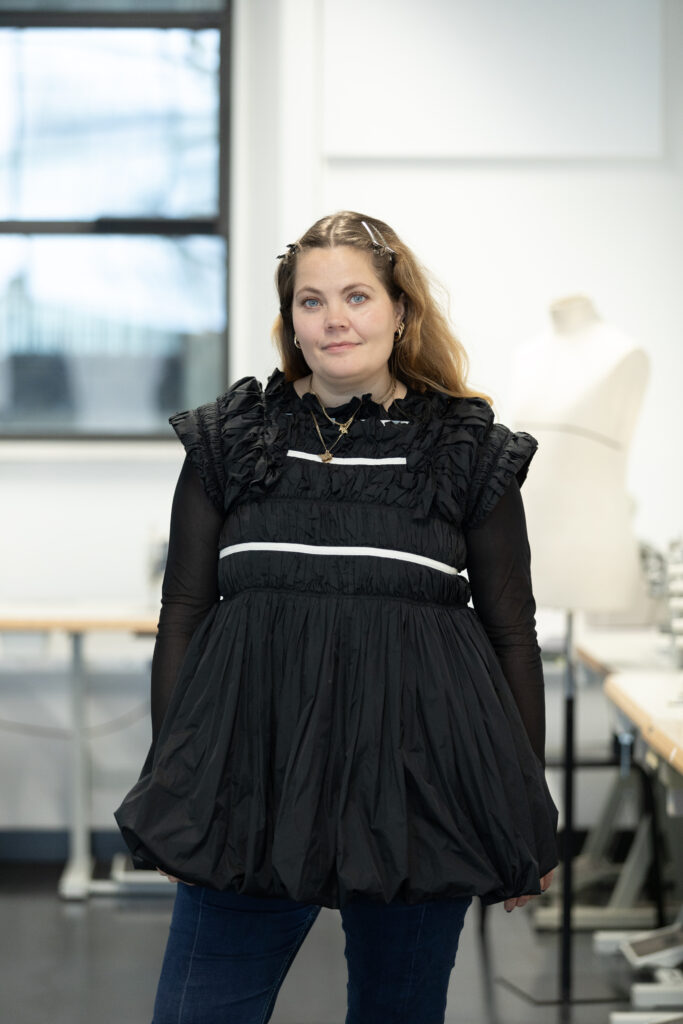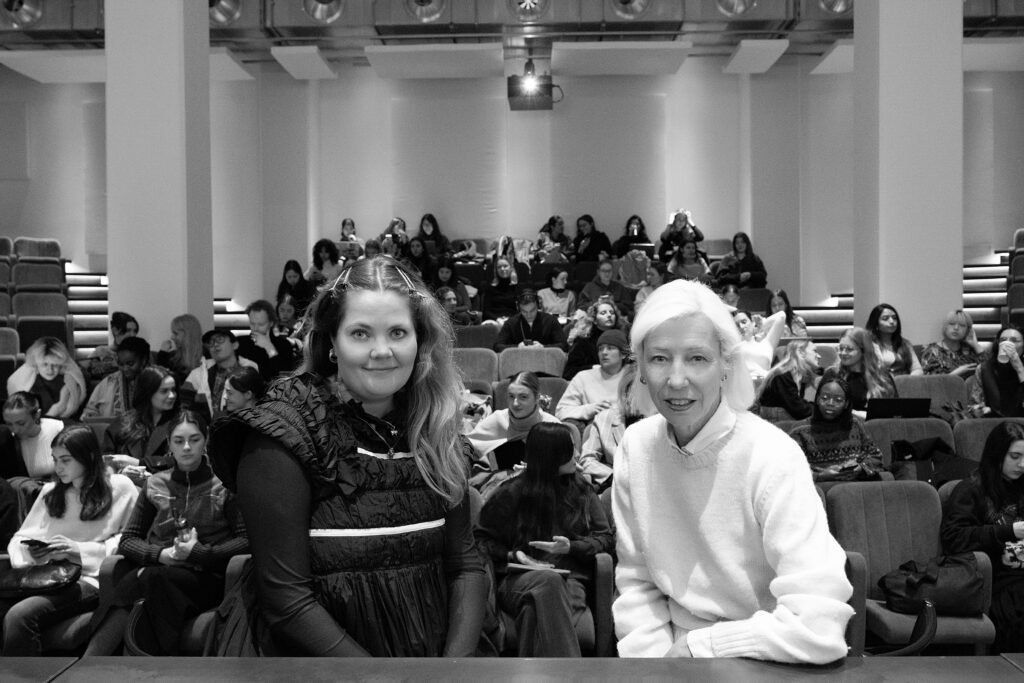In the second episode of Fashion: The New Establishment, we delve deeper into the evolving landscape of the fashion industry by engaging with Tessa Griffith, the Managing Director of Molly Goddard. Curated by Mimma Viglezio, this episode continues the series’ mission to illuminate the journeys, strategies and insights of the new vanguards shaping fashion’s future.
Episode 2: Tessa Griffith
If you told Tessa Griffith 10 years ago that she would be running a successful fashion brand alongside her childhood best friend, she would’ve called you crazy. “I’ve always cared about fashion and clothes but it wasn’t something I imagined my career to be”, she says.
Studying Art History at the University of Bristol, Tessa Griffith originally believed she would find herself with a career in the art industry. After graduating with her bachelors in art history, she started her work in the archive of the White Cube art gallery in London. Here she stayed for half a year before becoming the Studio and Production Manager for Kit Grover, a London based company which designs & creates artists’ editions, products, merchandise & commercial interiors, where she stayed for 2 years.

Wanting to work somewhere exciting, she began to work at London based magazine, i-D, as an editorial production manager where she worked behind the scenes on fashion shoots and worked closely with the fashion and design teams. “The eternal allure of the fashion covers is amazing. To see all the clothes up close, that’s what makes things so special.” It was here that Tessa began to learn about management, mostly from her colleagues coming to her and telling her what they were happy with and what they weren’t; understanding what to do and what not to do in the workplace. Tessa emphasized the importance of making sure your employees are happy, “If someone is happy and content and they feel valued then they’re going to do better work, why would you do it any other way? If people are miserable how can they get anything done”.
Tessa would meet frequently with her childhood friend, Molly Goddard, who was working on her own start up fashion brand. Tessa would give advice and insights into the brand and Molly would ask her to come work for her but Tessa was hesitant due to the fact that they were such close friends. “It felt crazier to go and work for a friend, you can always get another job but not another childhood best friend”, she says. Tessa decided to take the leap and became managing director of Molly Goddard, where she thought she would only stay for 6 months but it’s now been nearly 7 years.
The kickoff of the guest lecture saw students delving into an exploration of Tessa Griffiths’ foundation, engaging in a discussion with Mimma Viglezio on pivotal elements such as mentorship, work ethic, and the origins of Griffiths’ journey in the dynamic world of fashion – a captivating dialogue within the framework of Fashion: The New Establishment.
Exploring the intricacies of Tessa’s early experiences, students have come to appreciate the significance of her approach. Instead of memorizing textbooks and adhering strictly to the rules, she opted for a more insightful perspective – observing what worked and what didn’t, gaining valuable insights. Tessa’s inclusive engagement extended beyond a single team; she actively sought input from everyone, learning about their concerns and dissatisfactions. Armed with this
information, she endeavored to transform the ID magazine in the early stages of her career. It’s fascinating to note that her learning process involved a rare skill – listening. Tessa recognized the power of fostering a positive and valued environment, understanding that it is the key to a thriving system. She later on also pinpointed an emotional setback on her career after efforts to improve the work environment and being made redundant by the magazine.

The conversation delved into the captivating choice of entering the startup world, where the stability of a fixed salary gives way to the unpredictable dynamics of a budding venture. It explores the distinctive challenges and opportunities inherent in the fashion startup domain. Tessa contemplates the perceived “craziness” of a childhood friend turned business collaborator, which to this day stands as a testament to long lasting bonds. Tessa envisioned a scenario where specialists excel in their respective roles, for instance freeing the pattern cutter to concentrate on their craft without the burden of additional tasks like packaging and shipping. Returning to the theme of childhood friends embarking on business ventures, Tessa acknowledged both the dangers and opportunities. the potential for falling out and creating a rift is recognized as a significant danger. However, Tessa highlighted the merits of partnerships where friends possess complementary skills, she shared her approach with Molly – she acknowledged Molly’s design prowess while relying on her own reliability and trustworthiness for the business side.
This conversation provided students a new perspective on the intricacies of Molly Goddard, weaving personal anecdotes with practical insights into building both the brand and enduring partnerships. She dispels the notion that running a business lacks glamor, emphasizing the collective effort required, from handling rolls of fabric to various tasks that demand everyone’s involvement. Tessa underscored the importance of fair salaries in the industry, questioning the feasibility of a designer globetrotting, while the team scrimps on essentials. ”In our fashion venture, we have a team of 14 dedicated employees, complemented by the expertise of 3/4 freelancers and an additional 3/4 students on placement”.
Molly and Tessa, both compassionate individuals, ensure that every team member, including the students, receive unwavering support and essential resources. In this female funded company, the emphasis lies not only on professional development but also on fostering a positive and inclusive work environment. “To be a good managing director for a fashion brand, you’re interested in hearing about people’s opinions, reading books, and having hunger for things. This is what is so interesting.” The commitment to employee well-being is evident, with only a minimal turnover of 3 individuals in the past 7 years. The inclusivity extends to the collection, embracing gender-neutral designs, “it’s not that big of a deal, if you love clothes it doesn’t matter if you’re a man or a woman”. However, Molly’s deliberate choice to hire more women and align with a women-oriented focus is rooted in practical considerations. Noteworthy moments, such as Young Thug wearing one of Molly Goddard dresses, exemplify the brand’s impact and universal appeal. .
Delving into the essence of key elements such as brand image, reputation, investments, and challenges posed by product reproductions, Molly Goddard’s managing director revealed many instances. These instances shine through in reshaping how dresses are worn, offering versatile options in tulle and taffeta tailored for various body types, “the person who looks the best is the person who looks comfortable” she says. The conversation transitioned to the delicate equilibrium between business and creativity, as the brand prioritizes reinvesting in products, techniques, machinery, and materials. Upholding integrity, the brand strives for a distinctive signature that transcends trends, emphasizing a commitment to quality over quantity – “Integrity is a designer who knows what they want and not flip flopping around with trends”. The dialogue emphasized the belief that the initial stages of starting and building the brand carry more weight than seeking external investments.
Candidly addressing the challenges posed by imitations, Griffith expressed the emotional impact of witnessing beloved designs replicated by high street brands, emphasizing an ongoing effort to foster understanding and appreciation for the original work. “The Larry dress, that is quite distinctive, is my favorite dress. It’s so heavy but so full and looks amazing on everyone. A big online fast fashion made a rip off. It was sold out. It’s kind of heart breaking.” Acknowledging the complexity of the fashion industry, the conversation has been concluded by highlighting the mix of emotions by a dual nature of accessibility and heartbreak within the realm of fashion democracy. “Every time it’s a dagger through the heart, but you just have to keep going and hope people will understand that it’s your work. There’s not much you can do about it. It’s flattering but frustrating when you don’t get credit after seeing how much work has gone into it.”

Upon concluding the discussion, the spotlight has been given to Polimoda students concerning their queries about Molly Goddard.
With having a start up and so many seasons, how do you still have a moral code and also the time for the designer to have freedom and bring a profit?
Tessa: It wasn’t easy, Molly and I worked longer It’s not what we could have expected. You just create time for creative things. If you don’t, you just don’t have a good collection. If she doesn’t love a piece it will not sell. You need that open time because if not, you wont make the cut later; or if you do take it out, it will be a waste of time.”
How do you exercise curiosity and how do you advise us to do that?
Tessa: I am obsessed with reading, nothing makes me more This involves not looking at your phone but going into a library, a museum, having a conversation outside of fashion, talking with older people. Be open minded, this is your tunnel vision of learning.
You seem to have strong moral codes on and off the clock especially about how long employees work and not giving garments away for free. I’m curious to know how you learnt these values?
Tessa: Recruitment is fun, people want to work with us and it pays off when people are excited to work for us. In terms of moral codes I have a lot of siblings and I’m the 6th child, we are 5 girls and 1 boy, so you can’t really get away with.
Having to have differentiation factors compared to other brands can be frustrating, how did you allow the designer to have their freedom and still make profit?
Tessa: Molly and I worked long hours with an incredibly committed team. You create time for creative things. If not, you won’t have a great collection. If she doesn’t love a piece then it is not successful, you need that open time and you have to make it or you aren’t going to make the cash”.
How did you know where to start within your position and not be overwhelmed by it?
Tessa: There is a really inelegant phase: you throw enough eggs at the wall and hope some of it sticks, having worked with previous experiences, people are so up for helping you – if you listen, they will be open minded and kind – there is so much opportunity to ask for.
Why did you never ask for a fashion investment? When entering this industry, the financial aspect is very important.
Tessa: Molly sold first collection to Dover street and made most of it herself so it was quite cheap and therefore reinvested the We haven’t taken an investment because it’s not in the grants of possibility, to this date we have been able to invest some money into profits and this might change in future. There have been some cash injections that have mostly been granted. But for fulfilling our goals. Investment would mean a much bigger thing, you would need to open new stores. Some companies can’t be financially sustainable in 7 years – they need a manager that is serious with money (being careful with spending).
Something very interesting and nice is that you need trust and also allow every person to be in their position. I was wondering how you saw that has changed with every year your company has grown more and more?
Tessa: Everyone has to get stuck in. You don’t want to waste someone’s time when they have a valuable skill Before you’re in a business, it’s amazing to have a network of people you want to work with. We still work with people who we worked with a long time ago.
I see many companies that have been inclusive but when it comes to the work side it doesn’t reflect on inclusiveness. Is this a part of what will be heritage?
Tessa: Mentoring matters is an international platform for When we are recruiting we do have a policy to make our recruitment as diverse as possible. Although when you are hiring one person a year it is kind of difficult to be as diverse. It’s not all posh white girls, it’s not 10 of me.
Creating a business in an emerging country is tough. How was it for you in the UK?
Tessa: We had a big difference. We had presentations, she wanted the girls to do something. When brands don’t have money for runway they do They were also street cast models. One of the first presentations was in a class full of students drawing a naked man. For Molly it made more sense to have a meaning and build a story around the collection. Trying to stand out when back in the day it was not as popular.
Do you have an art direction department, how does that work?
Tessa: Alice styles all of the work. She is also Molly’s younger sister. She has a clear understanding of what Molly wants, with our brand the clothes are the narrative so it’s having everything quite clean behind It’s something that Molly trusts her with and they speak the same language.
In conclusion, reflecting on the conversation with Mimma Viglezio Fashion: The New Establishment, the students’ key takeaway from Tessa Griffith, was her emphasis on the importance of having a fair, open workplace where kindness and respect are amongst the top values. She instilled hope in the room by showing that it is possible to run a successful fashion business without any outsider fundings and being a 100% female-funded and 100% female-managed company. The Polimoda Institute and its students are grateful and appreciate the time Tessa spent and gave for discussing various topics while inspiring and voicing her personal perspectives and experiences in the industry.
CREDITS
Written by:
- Eoff Eliot, Undergraduate in Fashion Business student
- Eleonora Grierson, Undergraduate in Fashion Business student
- Vanja Tadic, Undergraduate in Fashion Business student